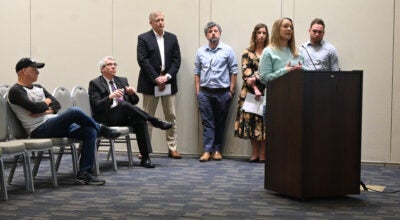‘People, planet, profit’ motivate Duke Energy’s decisions
Published 12:00 am Wednesday, December 2, 2009
By Elizabeth Cook
ecook@salisburypost.com
Debating energy sources with the state president of the Sierra Club, Ellen Ruff says she offered a simple question.
“What would you do if you were in my shoes?” asked Ruff, president of Duke Energy.
The environmentalist was quick to answer. “I would so not be in your shoes,” she said, according to Ruff.
That drew a chuckle from her audience at Catawba College Wednesday, as Ruff explained how her business calls for making tradeoffs and choices.
While it may be easy to point out the downside of coal, for example, and call for more wind and solar power, she said, Duke has to consider costs as well as environmental impact.
The nation needs to decide, she said, how it wants to continue to have reliable, clean, cost-effective electricity.
“I’m not sure there’s any one right answer,” she said.
Duke Energy is about people, planet and profit, she said, and must keep in mind that it is a publicly held company.
“What we have learned again this week,” she said, “is how important a balance sheet is.”
Ruff, a 30-year employee of Duke, leads the company’s utility business in North and South Carolina, providing electricity and value-added products and services to more than 2.3 million customers in a 24,000 square-mile service area. She was the keynote speaker for the second Distinguished CEO Lecture Series at Catawba.
While acknowledging her company’s responsibility to future generations, she said, “We have the fleet we have today because of decisions we made in the ’70s. Today is an exciting opportunity to look forward and make decisions of such importance, but there’s also risk and opportunity in all decisions.”
Currently 98 percent of Duke’s energy comes from the use of coal or nuclear power, which accounts for the company’s relatively low rates, she said. But the price of coal has tripled, and building nuclear plants is a lengthy, expensive process.
She identified three other resources for meeting energy demand: natural gas, renewables and energy efficiency.
Natural gas is volatile, she said, and the renewables ó solar, wind, new hydro, bio masses, including swine and turkey waste ó do not always have low costs.
Efficiency presents challenges, too. Ruff said expecting Duke Energy to promote energy efficiency was like asking Food Lion to sell less food.
“How much is appropriate to charge for energy efficiency?” she asked. “What is the business model that will make it go?”
She said Duke Energy believes there could be a balance in the five fuels. “There has to be,” she said.
“We have an electric system that’s pretty similar to what it was 50 years ago, and what we have discovered is an interest and a concern on a personal level about what can I do to leave a smaller environmental footprint.
“There is a clear desire not to over-build and have too much plant,” she said. “… What is a win-win between shareholders and customers that will achieve that?”Ruff urged her audience of several hundred to make their concerns known and to participate in the dialog about their energy future.
“What keeps me awake at night is the thought that we will fail to make a decision about our energy future,” she said. “No decision is the worst decision we can make.”
In the question-and-answer session that followed, one member of the audience asked Ruff if the consequences of mountain top removal, a method of mining coal, kept her awake at night.
Duke’s construction of a new coal-burning plant at Cliffside stirred tremendous resistance from environmentalists and others ó more, Ruff said, than Duke Energy had estimated.
“We have an obligation by statute to provide power,” she said, and coal is a very important part of the company’s portfolio.
Ruff also visited business classes and toured the Catawba campus. Her visit was sponsored by the Business Advisory Board for the Ralph W. Ketner School of Business.Sponsors included Susan Cloninger, presenting sponsor; Duke Energy and Marilyn Wagner, MJW Enterprises, gold sponsors; Ralph W. Ketner, Community Bank of Rowan and Walker Marketing, silver sponsors; and Charles and Susan Muse, Food Lion, Liberty Aircraft, USA, Inc., and Richard Smith, bronze sponsors.
Catawba College public relations contributed to this article.




